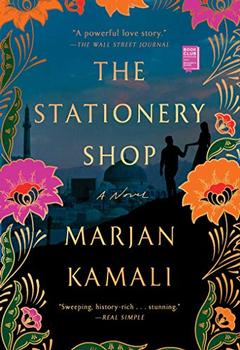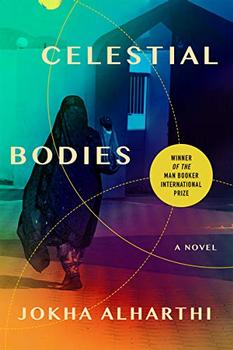Summary | Excerpt | Reading Guide | Reviews | Beyond the book | Read-Alikes | Genres & Themes | Author Bio

A Novel
by Marjan KamaliMy favorite literature creates worlds that I cannot visit in person. Marjan Kamali's The Stationery Shop swept me completely into the alluring but dangerous world of Tehran, Iran, circa 1953, the year the nation's democracy underwent a violent U.S.-backed coup d'état. Reckoning with a traumatic past, Kamali has written a thoughtful novel that doubles as a multi-generational love story and a realistic depiction of Iranian-American immigrant experience; the work is a welcome addition to the canon of literature written by Iranian diaspora authors.
Readers discover an emotional journey that resonates with love, loss, time, and memory. The main character, Roya, is a high school student in Tehran who spends most of her afternoons at Mr. Fakhri's Stationery Shop. Here, Roya browses books and dreams about her future. One day, she meets Bahman, a rebellious aspiring journalist who visits the shop to help Mr. Fakhri distribute pro-democratic political pamphlets. In an era before cell phones or social media Mr. Fakhri becomes a secret go-between for Roya and Bahman, who are worried about keeping their relationship hidden from their parents. In 1950s Iran, it's not common for non-married couples to interact without chaperones; the shopkeeper helps facilitate the lovers' exchange of letters hidden in books, heightening the novel's dramatic tension.
As the author develops a gripping romance, she fully renders Tehran in the 1950s, portraying the city as a vibrant crossroads of culture, politics, history, and new opportunities for women. While many families still require arranged marriages, Roya is somewhat confident that her middle-class parents will permit her to marry Bahman, but she's unprepared for the magnitude of disapproval that Bahman's mother, Badri, will inflict. In lyrical prose Kamali weaves an elaborate story of love ripped apart by forces of political strife and family constraints.
The main storyline of Roya and Bahman's courtship in 1953 is knotted with a complex subplot involving Bahman's mother, who grew up as the impoverished daughter of a melon vendor. Past trauma has rendered Badri mentally unstable and manipulative; her tragic backstory as well as her own secret girlhood love story, ending in disappointment, makes the cruel character sympathetic. It's as if Tehran holds heartbreak in every street, whether lost love between people, destruction of once-cherished landmarks, or loss of homeland when people move into exile as political refugees.
Roya and Bahman aren't able to marry due to a series of political and family circumstances. The novel opens and closes with a snapshot of 2013 and their surprise reunion. While I appreciated learning that Roya and Bahman eventually meet in America after a sixty-year separation, I found that the opening chapter deprived the teenage romance of suspense it might have otherwise had. Still, Kamali's storytelling and descriptive skills shine throughout the novel, making it well worth the read. Pages shimmer with sensory images of the time: landmarks such as the Cinema Metropole and Sepah Square, celebration of Persian New Year, elaborate cuisine, snippets of Rumi's poetry, the terrifying force of violent street demonstrations, scents and sounds and colors of open-air marketplaces:
With a knife that looks like a sword, the girl's father magically whisks out the inner soft flesh of the fruit and sells slices and chunks to his thirsty customers. Some customers take a whole melon and drop it into their baskets; others want the immediate sweetness, the cool relief of melon cut and iced. The ice is just as special as the fruit, and the melon seller comes to the bazaar every morning carrying a coveted block of it.
Almost half of the novel takes place in America, where Roya and her sister are sent to study at Mills College in California as Iran's political climate deteriorates following the coup. Roya struggles to recover from heartbreak; Zari revels in the personal and intellectual freedoms offered by a liberal arts college. Roya studies science and Zari studies literature. Both sisters lean on each other and eventually marry American men. The author Marjan Kamali (whose parents are Iranian) grew up in Turkey, Iran, and the United States; informed by her own multinational upbringing, she renders layers of the immigrant experience with sensitivity and insight:
At first Roya felt like a mime, hand motions and exaggerated shrugs making up for her lack of English words. All she lacked were painted tears. Being in a new country felt like being plunged into a darkened room. In the beginning, nothing was distinguishable; it was all blurry blobs at best. But eventually, her eyes adjusted.
In such passages Kamali crafts a tender balance of the personal with the universal. Just because a young person is free to date or marry the person their heart chooses, life may not remain forever sweet.
A testament to the enduring powers of storytelling and first love, The Stationery Shop is likely to be a favorite with booksellers and book groups. The author's website provides a reading guide; the novel absolutely invites reading and discussion along with sweet or savory Iranian cuisine.
![]() This review was originally published in The BookBrowse Review in August 2019, and has been updated for the
February 2020 edition.
Click here to go to this issue.
This review was originally published in The BookBrowse Review in August 2019, and has been updated for the
February 2020 edition.
Click here to go to this issue.

If you liked The Stationery Shop, try these:

by Nazanine Hozar
Published 2021
An extraordinary, cinematic saga of rags-to-riches-to-revolution--called a "Doctor Zhivago of Iran" by Margaret Atwood--that follows an orphan girl coming of age at a time of dramatic upheaval.

by Jokha Alharthi
Published 2019
In the village of al-Awafi in Oman, we encounter three sisters: Mayya, who marries after a heartbreak; Asma, who marries from a sense of duty; and Khawla, who chooses to refuse all offers and await a reunion with the man she loves, who has emigrated to Canada.




Men are more moral than they think...
Click Here to find out who said this, as well as discovering other famous literary quotes!
Your guide toexceptional books
BookBrowse seeks out and recommends the best in contemporary fiction and nonfiction—books that not only engage and entertain but also deepen our understanding of ourselves and the world around us.